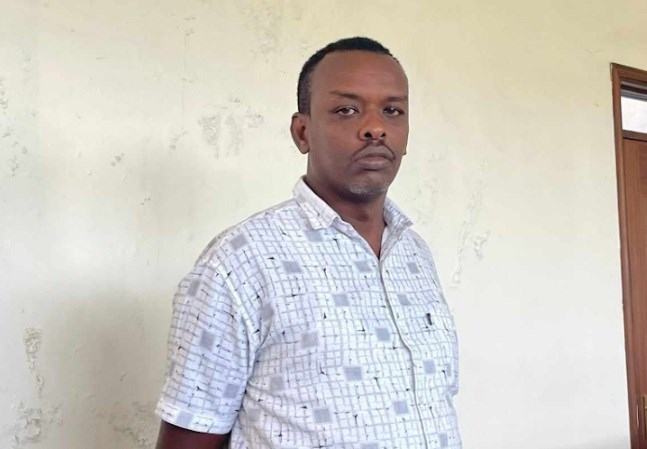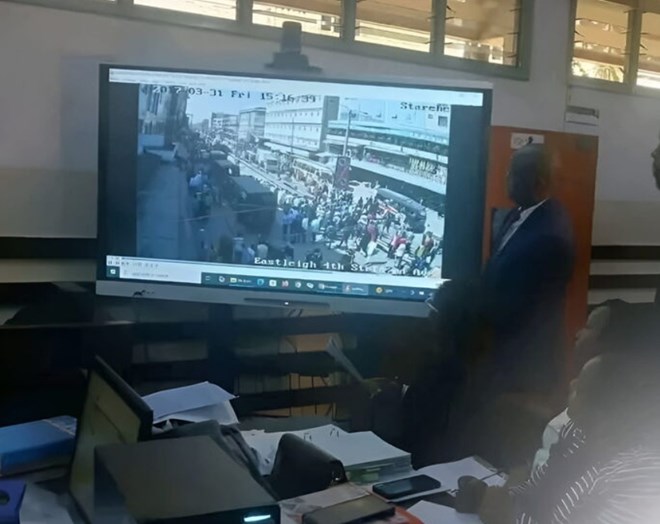
Tuesday July 29, 2025
The Ahmed Rashid trial tests Kenya’s response to police killings caught on video.

Former Pangani police officer Ahmed Rashid Hassan appears in court to face murder charges related to the 2017 killings of two teenagers in Eastleigh. Rashid is accused of carrying out extrajudicial killings during his tenure with the elite Pangani Six unit. (Photo: Joseph Ndunda/File)
NAIROBI, Kenya (HOL) — Former Kenyan police officer Ahmed Rashid appeared before the High Court in Nairobi this week, facing two counts of murder over the 2017 killings of unarmed teenagers in Eastleigh, a densely populated neighbourhood in the capital. Prosecutors presented surveillance footage showing Rashid shooting the youths at close range in a public market area.
The trial, presided over by Justice Diana Kavedza and widely seen as a key test of police accountability in Kenya, reviewed graphic video evidence retrieved from Nairobi’s Integrated Communication, Command, and Control Centre (IC3). The footage, authenticated by the Directorate of Criminal Investigations (DCI), shows Rashid—dressed in a red T-shirt and plain clothes—chasing one of the teens near Amal Shopping Complex before shooting him. A separate clip shows Rashid slapping a wounded youth on the ground before pointing a pistol downward and firing again.
The victims, identified as Jamal Mohamed and Mohamed Dahir Kheri, appeared to be unarmed and under police restraint when they were killed on March 31, 2017. The footage went viral at the time, sparking national and international outrage.
Testifying in court, DCI surveillance expert Frederick Gichuki said the operation was triggered by intelligence indicating that ten armed members of the Gaza gang had boarded minibuses from Kayole to Eastleigh to carry out a robbery. Undercover officers were deployed to track their movements using Nairobi’s citywide surveillance network, which includes CCTV and automatic number plate recognition (ANPR) systems. Four suspects were seen entering a building, prompting a rapid tactical response.
The video footage was handed over to lead investigator Constable Joseph Owanga and later certified for legal use in court. Prosecutors argue the use of force was excessive, pointing to the victims’ lack of resistance in the footage.

Court officials watch CCTV footage showing the March 31, 2017 shooting of two unarmed teenagers in Eastleigh, during the trial of former police officer Ahmed Rashid at the High Court in Nairobi on July 29, 2025. (Photo: IPOA)
The Independent Policing Oversight Authority (IPOA), which investigated the killings, concluded that Rashid used unlawful force and recommended murder charges. Rashid was formally indicted in April 2023 and pleaded not guilty. He was granted bail of Ksh200,000.
At the time of the incident, Rashid served with the elite Starehe Special Police Initiative and Vigilance (SPIV), also known as the Pangani Six. The unit was tasked with confronting Nairobi’s most violent gangs, including the Gaza gang in Kayole and the Super Power gang in Eastleigh. Both groups were widely feared for carrying out brazen robberies, murders, and extortion, often in crowded public areas.
The Gaza gang had gained notoriety in Naironi for its violent robberies and targeted killings, often filmed and shared on social media. The Super Power gang operated with similar impunity in Eastleigh.
Despite the charges, Rashid retains support in some quarters. In 2022, the Eastleigh Business District Association publicly defended him, crediting him with dismantling the Super Power gang and restoring safety. “Before Ahmed Rashid was deployed to this area, Eastleigh was uninhabitable,” the association’s secretary said. “People have forgotten about Super Power—they thrived here, and because of him, they are no longer around.”
The trial has also exposed resistance within Kenya’s police service. Of the six officers summoned to testify against Rashid, five refused to appear in court. Justice Kavedza fined each officer Ksh10,000 or sentenced them to three months in jail, and ordered the Inspector General of Police to ensure their attendance.
The trial has drawn national attention not only due to the brutality captured on video but also because it’s unfolding against the backdrop of mounting public scrutiny over police violence in Kenya. In 2024, at least 104 people were killed in incidents involving the police, with 55 reported cases of enforced disappearances, according to Missing Voices and Amnesty Kenya. Most occurred during nationwide protests against the Finance Bill, led by Kenya’s Gen Z movement. Many victims were later found in morgues with gunshot wounds, though death records listed causes such as drowning or natural causes, a pattern consistent with past efforts to conceal misconduct, as documented by Reuters.
The trial continues this week, with further witness testimony and forensic submissions expected. Its outcome is likely to shape the future of police accountability in a country where security forces have long operated with impunity, particularly in Nairobi’s marginalized and immigrant-heavy neighbourhoods like Eastleigh.






